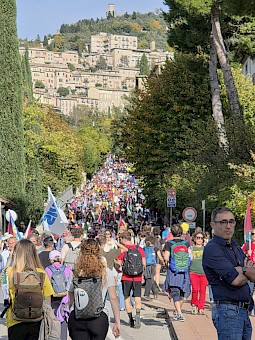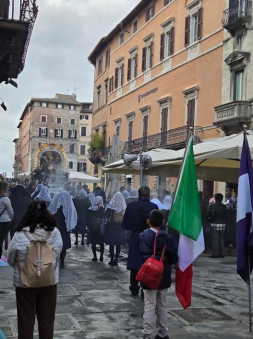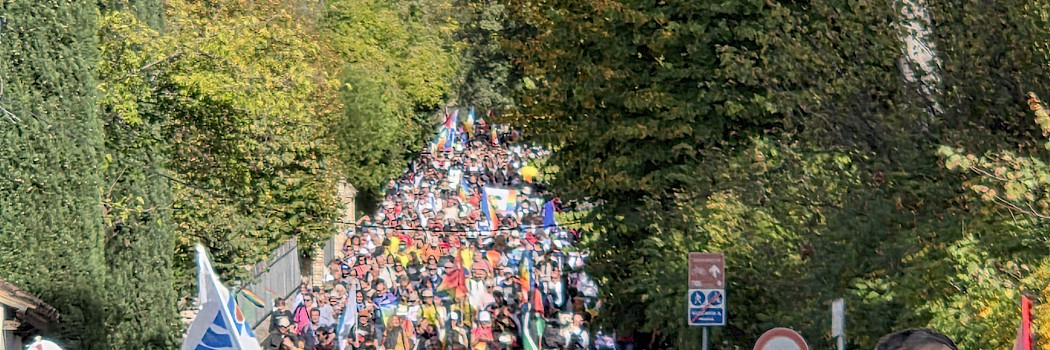Like Drops of Water: From Social Action to Ancient History in Perugia!
Written by 2025 October Scholar Karin McCollough
This experience in Perugia is a respite from the storm of bad news I’d allowed myself to be inundated by. In the midst of global chaos, I have been trying to immerse myself in opportunities to understand these issues during my time here in Perugia. For example, October marks the end of the Perugia Social Film Festival (PerSo), which features films that explore the complexity of modern social problems. Before each film, you are met with a screen that loosely translates to “A truly special day is one in which there’s no war.”
This event is just one example of the abundance of messages that I am surrounded by, which include inclusivity, acceptance, acknowledgment of our common humanity, exhortations to do the right thing, and to respect our Earth. I have found these sentiments in classrooms, theaters, churches, streets, museums, theaters, parks, and monuments throughout the city. It seems to me that Perugians consider these values of utmost importance. As a result, I realized that if we want to change the world for the better, it is important that we nurture and spread those messages everywhere in daily life.

Recently, I happily participated in the annual 24 kilometer March for Peace & Fraternity from Perugia to Assisi. I walked along with over 200,000 people, specifically my 21 year old Chinese classmate (you can really get to know somebody walking the road together for 5 hours!). This march was founded by Perugino Aldo Capitini in 1961, who was influenced by Mahatma Gandhi's teachings of nonviolence.
Like my colleagues from Seattle, I'm so touched by this experience of using the Italian language to get to know people of all ages from all over the globe. Unlike my previous visits to Italy, I feel I have a purpose and that I am part of the community. I have enjoyed striking up conversations with the locals working in shops and even while waiting in long lines at the grocery store. For example, I'm such a regular at Gelateria Augusta that the cashier and I are on a first name basis. In fact, we have long chats daily about chocolate, our families, even world politics.
How often do you get to speak Italian with people across the world in their teens to their 80s? My classes in Italian language, culture, art, history, and film are blessedly small. I enjoy hearing the illuminating and inspiring stories and opinions of my fellow classmates, who come from China, South Korea, Iran, Bulgaria, Romania, England, Tajikistan, Morocco, Argentina, Peru, Chile, Mexico, Brazil, Turkey, Germany, Israel, Poland, Switzerland, the Netherlands. Here, by speaking Italian, we must think more, listen more, and—perhaps—say less. At the same time, it does tickle me to discover my sense of humor translates into Italian—every day I say something so off the wall in my classes that everyone laughs at my silliness. I adore my professors: they're open to answering any question, providing insights into the Italian way of life.
One of the highlights of my time here has been both participating and accompanying Voci dal Mondo, which is the choir open to all students of the university. The choir is under the loving, encouraging, and cheerful direction of Maestro Bustos. On October 30, 2025, there will be a free concert that features members of Voci dal Mondo and a visiting choir from Germany. The program includes a Latin American mass, a spiritual, an Indigenous North American piece, an Italian folk song, and a jazz piece.

Daily I'm moved to tears by the beauty here! In the city, I have enjoyed film festivals, guided walks and tours, an open mic night, a live jazz performance, small classical music ensembles, Beethoven symphonies in La Basilica di San Pietro (SRO!), as well as lectures about a variety of topics, including music, opera, cooking, recently published books, and cinema.
One of the highlights of my excursions has been a guided visit of Underground Perugia. The visit allows attendees to view remains of ancient Etruscan settlements, such as the astoundingly deep well that is built under what is now called Palazzo Sorbello. During this visit, I learned that the Etruscans built an acropolis (without mortar, mind you!) around and upon the highest point of a 500 meter high hill and covered it in “waterproof” travertine to minimize damage when the inevitable earthquakes strike. The travertine blocks are 3 meters deep & each level is set two centimeters deeper than the previous level. As a result, the earth in the center of these “walls” absorbs the quaking and the buildings above are not damaged by seismic activity. The Perugians I speak with are passionate about sharing the history of this town, which goes back hundreds of years. Through these different excursions, the perugians have shared with me their respect for the intelligence and engineering feats of the generations before them, while also expressing their hope for an even better future for the generations to come.

If you get the chance, I encourage you to get outside what you think is your “comfort zone” and come to Perugia and study at the Università per Stranieri. To that end, SPSCA’s scholarship program isn’t just an Italian language learning experience. It is also a chance to make a difference in the world through one interaction at a time. My recommendation for future scholars is to unplug, show up, be present, listen to others, be kind, be open, and share your own perspectives.
In times of trouble, we might wring our hands or hide our head in the sand thinking “I'm powerless” or “I want to pretend this isn't happening.” But, if we can just be patient and do what seems good no matter how tiny or insignificant we feel we are, I think we—like one drop of water at a time—will be making the world better for all. SPSCA & the l’Università per Stranieri di Perugia are wonderful organizations for doing that: I thank both of them for this opportunity to be a drop of water and be surrounded by all these other precious drops of water.

